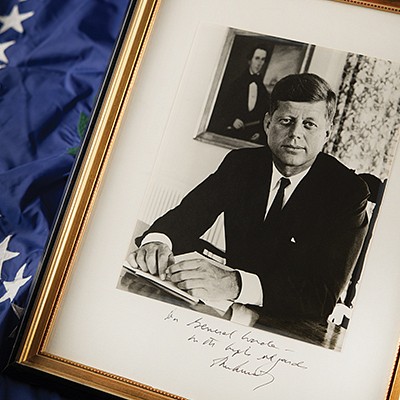Lyndon B. Johnson Civil Rights Act Signing Pen - Presented to an Influential Illinois Congressman
Two ways to bid:
- Leave a max absentee bid and the platform will bid on your behalf up to your maximum bid during the live auction.
- Bid live during the auction and your bids will be submitted real-time to the auctioneer.
Bid Increments
| Price | Bid Increment |
|---|---|
| $0 | $5 |
| $50 | $10 |
| $200 | $25 |
| $500 | $50 |
About Auction
May 15, 2024
Boasting nearly 800 lots, RR Auction's May Fine Autographs and Artifacts sale is highlighted by a section honoring the anniversary of President John F. Kennedy's birth—including important signed photographs, a remarkable Kennedy family-signed book, a knife used to slice his inaugural cake, a page from his pioneering Peace Corps legislation, and scarce teletype reports on his assassination. RR Auction support@rrauction.com
- Lot Description
Historic dipping pen used by President Lyndon B. Johnson to sign the landmark Civil Rights Act of 1964 (H.R. 7152), presented to Illinois Congressman Dan Rostenkowski. The official 'bill signer' Esterbrook pen measures 6.25″ long and features a black plastic grip with a Lucite handle imprinted with "The President—The White House." The pen is mounted with a Newsweek article image of LBJ signing the act and the pen’s original typed descriptive slip: “One of the pens used by the President, July 2, 1964, in signing H.R. 7152, An Act to enforce the constitutional right to vote, to confer jurisdiction upon the district courts of the United States to provide injunctive relief against discrimination in public accommodations, to authorize the Attorney General to institute suits to protect constitutional rights in public facilities and public education, to extend the Commission on Civil Rights, to prevent discrimination in federally assisted programs, to establish a Commission on Equal Employment Opportunity, and for other purposes.” Framed to an overall size of 8.5 x 8.75.
Also included is a vintage matte-finish 7.5 x 9.5 photo of Johnson, affixed to its original 11 x 14 mount, which is signed and inscribed in fountain pen, “To Dan Rostenkowski, with warm regards from his friend, Lyndon B. Johnson.” In fine condition, with scattered light stains to the photograph's mount.
Prior to his assassination, President Kennedy had called for legislation to end racial discrimination and segregation in public accommodations, public education, and federally assisted programs. Shortly after his death, President Johnson urged Congress to honor his memory by passing such an act, declaring, 'We have talked long enough in this country about equal rights. We have talked for one hundred years or more. It is time now to write the next chapter, and to write it in the books of law.' His appeal was successful and manifested itself in HR 7152, the Civil Rights Act of 1964, a landmark piece of legislation that banned segregation and racial discrimination while guaranteeing equal job opportunities. The tremendous sociopolitical impact made the Civil Rights Act a crowning achievement of the 1960s Democrats and one of the most important laws passed in the 20th century.
Chicago politician Dan Rostenkowski (1928-2010) was one of the most powerful legislators in Congress, especially in matters of taxation. During his career, he held positions such as Chair of the House Democratic Caucus, House Democratic Chief Deputy Whip, and Chair of the House Ways and Means Committee. However, after 34 years of serving as an Illinois congressman, Rostenkowski was defeated for reelection in 1994 amid an investigation by the Justice Department for his involvement in the House Post Office scandal. In 1996, he pleaded guilty to reduced charges of mail fraud and was fined and sentenced to 17 months in prison, 15 of which he served at the Oxford Federal Correctional Institution in Wisconsin. President Clinton pardoned Rostenkowski in December 2000, remarking that 'Rostenkowski had done a lot for his country and had more than paid for his mistakes.' - Shipping Info
-
Bidder is liable for shipping and handling and providing accurate information as to shipping or delivery locations and arranging for such. RR Auction is unable to combine purchases from other auctions or affiliates into one package for shipping purposes. Lots won will be shipped in a commercially reasonable time after payment in good funds for the merchandise and the shipping fees are received or credit extended, except when third-party shipment occurs. Bidder agrees that service and handling charges related to shipping items which are not pre-paid may be charged to a credit card on file with RR Auction. Successful international Bidders shall provide written shipping instructions, including specified Customs declarations, to RR Auction for any lots to be delivered outside of the United States. NOTE: Declaration value shall be the item’(s) hammer price and RR Auction shall use the correct harmonized code for the lot. Domestic Bidders on lots designated for third-party shipment must designate the common carrier, accept risk of loss, and prepay shipping costs.
-
- Buyer's Premium



 EUR
EUR CAD
CAD AUD
AUD GBP
GBP MXN
MXN HKD
HKD CNY
CNY MYR
MYR SEK
SEK SGD
SGD CHF
CHF THB
THB






